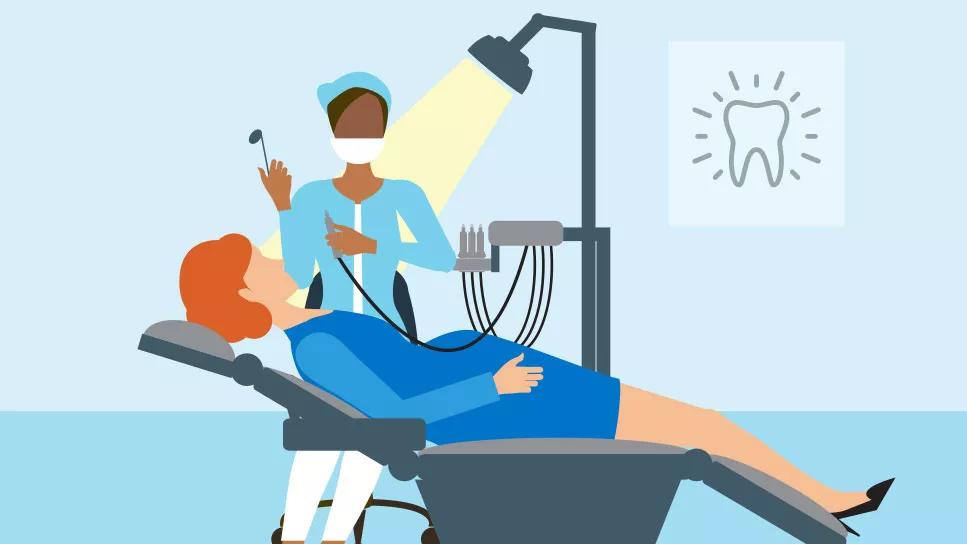Dental care is not only safe during pregnancy, but it’s also highly recommended

Pregnancy fills your calendar with many, many recommended healthcare visits. Given all those appointments, you might be tempted to skip that trip to the dentist for your regular six-month cleaning and exam.
Advertisement
Cleveland Clinic is a non-profit academic medical center. Advertising on our site helps support our mission. We do not endorse non-Cleveland Clinic products or services. Policy
A word of advice? Don’t cancel. You might need that visit now more than ever.
Pregnancy increases your risk for dental issues that can affect you and the fetus if left untreated. It’s critically important to continue getting oral care and needed dental work during this time.
To learn more, we turn to Ob/Gyn Julian Peskin, MD.
It’s not exactly shocking news that pregnancy ramps up hormone production. But what may surprise you a bit is how that increased hormone load can lead to periodontal (or gum) disease.
That surge in hormones can cause inflammation in your gums, explains Dr. Peskin. Food can more easily become trapped in swollen gums, leading to a plaque buildup on your gumline and gingivitis.
It’s estimated that 60% to 75% of those who are pregnant develop gingivitis, according to the U.S. Centers for Disease Control and Prevention (CDC).
Pregnancy hormones also can cause morning sickness and vomiting. Acid that gushes up from your stomach when you vomit can eat away at the tough layer of enamel on your teeth, leading to decay and cavities.
The gag reflex and nausea that come with morning sickness can also make you less likely to brush your teeth well, adding to the potential for decay.
Advertisement
Severe cases of gum disease can cause potential complications in your pregnancy. Research links periodontal disease to:
The benefits of seeing a dentist during pregnancy far outweigh any potential risks. That’s true whether you’re talking about basic tooth cleaning, having a cavity filled or more involved dental work.
“It’s perfectly fine to have gum surgery or other major dental work performed during pregnancy,” says Dr. Peskin. “You don’t have to wait.”
If you need considerable dental work and are experiencing morning sickness, talk to your dentist about the timing. “It’s probably best to do it in the second or third trimester when you aren’t experiencing as much nausea, vomiting or gag reflex,” she adds.
If you’re getting a dental X-ray, let your dentist know if you’re pregnant. “They will use a lead apron to protect your developing fetus and your thyroid,” says Dr. Peskin.
Local anesthetics (such as lidocaine) are considered safe to use during a dental procedure while pregnant, says Dr. Peskin. Studies show that any chance of a negative effect on you or the fetus is minimal at best.
But again, it’s always best to talk to your dentist and let them know that you’re pregnant before any procedures.
The keys to good oral health are the same whether you’re pregnant or not. Keep brushing your teeth at least twice a day with toothpaste and continue to floss. If you use mouthwash, look for an alcohol-free product.
Shop for bland-tasting toothpaste if flavored varieties seem to jumpstart morning sickness. If you do vomit, rinsing with a simple mix of water and baking soda can help protect your teeth.
Keep brushing and flossing your chompers and DO NOT CANCEL your regular visit for a dental exam. If your gums suddenly get more sensitive or start to bleed, talk to your dentist about getting checked for gingivitis.
Plus, eat a healthy, balanced pregnancy diet that includes tooth-friendly vitamins and minerals such as calcium, phosphorous, protein and vitamins A, C and D.
Advertisement

Sign up for our Health Essentials emails for expert guidance on nutrition, fitness, sleep, skin care and more.
Learn more about our editorial process.
Advertisement

Most rashes aren’t dangerous — but it’s worth talking to your pregnancy provider about them

The best available evidence indicates that, used correctly, acetaminophen is safe to take throughout a pregnancy

Prenatal massage, done properly, is a safe and effective way to lower stress and relieve pregnancy discomforts

Avoid high-mercury fish and processed meat, and go easy on salt and caffeine

Unless your healthcare provider tells you otherwise, it’s typically considered safe to have sex during pregnancy

Hot tubs and saunas raise your body temperature and can pose risks

Baths can be safe if you turn down the temp, avoid irritating bath products and take extra precautions against

SSRIs are the safest antidepressants to take in pregnancy — and pose less risk than unmanaged depression

Even small moments of time outdoors can help reduce stress, boost mood and restore a sense of calm

A correct prescription helps your eyes see clearly — but as natural changes occur, you may need stronger or different eyeglasses

Both are medical emergencies, but they are very distinct events with different causes